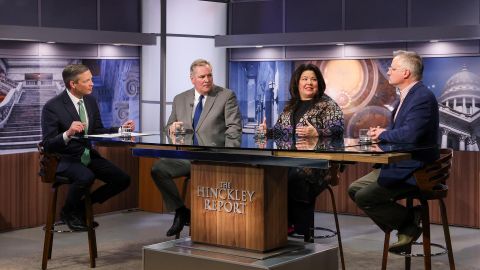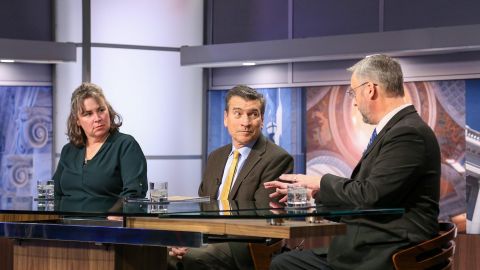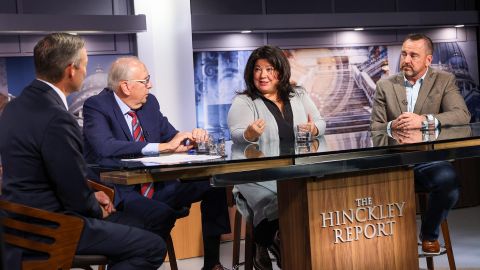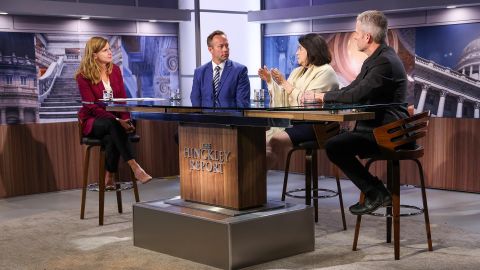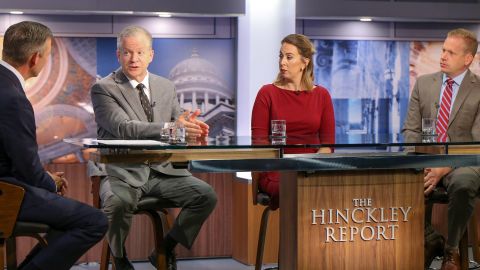announcer: Funding for the "Hinckley Report" is provided in part by the Cleone Peterson Eccles Foundation Fund, Merit Medical, and by contributions to PBS Utah from viewers like you.
Thank you.
Jason Perry: Tonight on "The Hinckley Report."
With the end of the 2024 legislative session in sight, state lawmakers race to pass legislation.
Leaders adjust spending recommendations after receiving new revenue numbers.
And Utahns react as Congress continues to debate tough issues.
♪♪♪ ♪♪♪ Jason Perry: Good evening, and welcome to the "Hinckley Report."
I'm Jason Perry, Director of the Hinckley Institute of Politics.
Covering the week we have Lindsay Aerts, reporter with KSL 5 TV; Taylor Morgan, partner with Morgan and May Public Affairs; and Marty Carpenter, partner at Northbound Strategy.
Thank you so much for being with us.
A lot happening in the legislative session, a lot happening with some of our other elected officials.
Lindsay, I wanna start with you for just a moment about school board member Cline.
Last week she posted a photo, we've talked about this in the news, we talked about on the "Hinckley Report," of a Granite school student athlete and asserted that she may have been a transgender athlete.
The response was quick, but our legislature over the last couple of days got very involved.
Talk about that.
Lindsay Aerts: So, what we had happened midweek was the state school board actually came out, took some action, basically as much action as they could in terms of their punishment.
They don't have the authority as the board to impeach her.
Then yesterday we got the resolution about midday that the House of Representatives was going to censure her as opposed to impeachment, which is what we were all waiting for.
All week long we've been asking leaders, are we going to impeach?
Are we going to censure?
Are we going to do something in the middle?
Because there were some talks about potentially giving the authority to impeach to the state school board, perhaps the governor, some other person or body who could take action against her.
So, getting the resolution was significant, because it showed us the direction they were gonna go, and then the House and Senate suspended all the rules, passed it right through.
Governor signed it virtually immediately, and the pushback to the censure versus the impeachment was swift as well, right?
A lot of people coming out to say this isn't far enough.
It's a strongly worded slap on the wrist.
It doesn't have any teeth.
It doesn't go farther than what the state school board did.
But that's the decision they went.
Jason Perry: I wanna read the resolution for just a moment about the wording, and then, Taylor, I'm curious what you're hearing on the Hill as to why they went with this resolution to censure instead of to impeach.
Here is what this--what it says.
"Now, therefore, be it resolved that the legislature of the state of Utah, the governor concurring therein, condemns and denounces board member Cline's repugnant attack on a student in the strongest possible terms and finds such behavior irreconcilable with the responsibilities of the Utah State Board of Education member."
Taylor Morgan: Frankly, personally, I'm disappointed, Jason.
With that said, what I'm hearing on the Hill is that some legislative leaders were concerned that a full on impeachment of Natalie Cline could draw more national attention to the issue, could put that student and the family at risk of of further attention and further harm from that kind of national spotlight.
That being said, the thing they didn't mention in that resolution was that this is a child.
Not just a student, this is a minor child that Natalie Cline personally attacked on social media.
Anything short of an impeachment I think is a disappointment by the state legislature.
It's not going far enough.
Everyone is jumping on this bandwagon of calling for Natalie Cline to resign.
Natalie Cline herself has posted to social media that she will not resign, even in response to the state legislature's resolution yesterday.
She's made it clear that she intends to stay on the ballot and run for re-election.
And frankly, in a seat that she won by 40% in district 9, if she's not impeached, Jason, she will likely get re-elected.
That's unacceptable.
Jason Perry: Talk about that for a minute, Marty, because she has very been public, she's already talked to the Speaker of the House, saying, "I have no intention of resigning," in spite of this resolution that was passed.
Marty Carpenter: Now it's up to the voters to do the right thing, right?
And that's where it's gonna get really interesting, because she was popular enough to get elected before.
She's had other incidents where she's been out there a little bit out on a branch, on her own, out on a ledge, and put herself in a bad spot.
Look, the legislature didn't do it.
There's, I guess, an argument to be made for let the voters, who are the ones who actually choose their representation, let them decide who they actually want to send.
Well, you'd like to think they'll make the right decision here and say there are people who can represent your interests on the school board, but do it in a way with more class, more dignity, and in a way that doesn't put children in danger.
Lindsay Aerts: And as I was talking to legislative leaders this week, I got the sense that they were really wrestling with the impeachment decision, because to Marty's point, they wanted to let the voters decide.
But at the same time they wanted to hold her responsible.
They didn't want to blow it up nationally.
As Taylor said, that was something that the speaker said.
But yesterday, when we were talking to house majority right after the resolution passed the legislature, House Speaker Schultz said they didn't have the votes.
So, I wonder if it came down to they didn't have the votes, and they maybe would have gone that direction had they had the votes, but they didn't have-- you have to have two thirds majority to impeach.
Starts in the House, two thirds majority in the Senate as well.
And at least in the House they didn't have the votes.
Taylor Morgan: Can I just say, this is a huge missed opportunity by the state legislature in a year when the legislature has passed controversial legislation dealing with transgender Utahns.
This was an opportunity for the legislature to come together, to stand up and say, "No, we will not tolerate hate in our state," and they simply completely missed.
They whiffed on what was clearly an opportunity this year.
Disappointing.
Lindsay Aerts: I think they're wrestling too with the slippery slopeness of impeachment, right?
You impeach Natalie Cline for this situation, and in their minds it was, what does that open the door to the next person?
Someone posts something controversial on social media, are we impeaching them too?
So, I think they wrestled with that slippery slopeness of impeachment.
Jason Perry: Well, our elected officials are being asked to talk about what their vote would have been, including the governor just yesterday in his press conference as he talked with members of the media.
I wanna play that clip, because he's been asked, what would he do and what should have happened?
Marty, watch this, want you to give a comment to the governor's approach.
Spencer Cox: What I think should be done is I think she should resign, and that's the right thing to do, the best thing to do.
You know, whether she should be impeached or not, the--what happened yesterday has effectively removed her from any actions of the board.
And so, it--whether or not she's impeached, it probably is immaterial at this point, because that is in effect what has happened.
She's not, you know, she's not participating in a meeting, she's not able to participate on any of the committees.
She no longer has authority to even put agenda items on.
That's, again, that's a decision that was made.
So, that's effectively what has happened.
And so, that's--I support that, and I think that that's a really positive thing.
Jason Perry: Talk about that, and maybe add to that one point, Marty, too, because the state school board did strip her of certain opportunities that she might have.
Marty Carpenter: So, they've taken away a lot of her ability to actually act in the office, and that's a good thing.
I think that the most important point here is that, as the governor said right at the top, and I think it's easy part to skip right past, she should do the right thing, right?
You've been rendered essentially ineffective in that position.
You can't actively represent the way you would probably like to or the way that the system is set up for you too, to represent your constituents in that position.
The right thing to do here is to say I can't do this job effectively, I made a mistake, I need to resign.
I think we need to have a way where that's not the, like, the total death sentence for someone.
Maybe politically it is, but, you know, we have redemptive ways for people in society in general.
But I think the most important part of what the governor said there is she should do the right thing.
The right thing right now is clear to everybody except for her and probably a small group of advisers around her.
Lindsay Aerts: And as a journalist, I would push back on the governor a little bit to challenge his point that she's virtually been rendered useless on the state school board, because she can still vote.
She can still put motions forward to amend certain things, right?
So, she can't sit on a committee, so she doesn't have a say there.
She can't go to advisory committees, right, so she doesn't have an input there.
She has been given a strong rebuke and asked to resign, but she can still vote, and you can make the argument, well, she's representing the people, so the people deserve that vote, right?
But she still has a say on that board.
Jason Perry: Final comment.
Taylor Morgan: I would have liked to have seen Governor Cox call on the legislature to do the right thing and impeach Natalie Cline rather than just calling on Natalie Cline to do the right thing and resign.
I wish the governor would have called on the Utah legislature to also do the right thing.
Lindsay Aerts: I'm curious how you guys feel, though--I'm just gonna take this as a journalist--about this impeachment slippery slope though, because the legislature is so hesitant to use their impeachment power.
We haven't seen it used ever really, even in egregious situations.
And so, do you feel like this rises to that level?
I mean, both of you are saying they should have impeached.
But I'm curious as to how the legislature is really judicious with that power.
Taylor Morgan: So, this is not what we see in Congress where impeachment has become a political tool, and I think we'll get to that.
This is a unprecedented scenario in which a state school board member has personally attacked a child on social media.
That's unprecedented, and it's unacceptable.
And in my eyes, it does rise to the level of impeachment, no question.
Marty Carpenter: If you can't be trusted to protect students, you probably don't have a role to play on the state school board.
Jason Perry: Let's get to this issue, because you start talking about the potential of weaponizing the impeachment power.
You talk about it at the state level, but I think we should probably should talk about it, because it's happening on the national stage.
For the first time in 150 years, a secretary, the Secretary of Homeland Security, this is Alejandro Mayorkas--let's talk to you since this is your point, Lindsay--was just impeached by the House.
A lot of stuff has to happen next, but talk about that weaponization, particularly on something--it's a high crimes and misdemeanors standard is what the House is using for this particular position.
Lindsay Aerts: Right, and I will compare the state to the federal level, because the point I just made was the Utah legislature is very judicious with the power, but it feels like the federal government is much more loose in their using of impeachment, right?
And so, it's hard to see past the political nature of this, where we have never impeached a cabinet member at the federal level, right?
So, it is really curious to me to go beyond the politics of this.
Jason Perry: Marty, we should talk about the politics of this, because it's very interesting.
I'm gonna quote John Curtis here in just a moment.
But what happened here, this is the second vote on this particular position.
This time the House did have the votes, it was 214 to 213 for this impeachment.
Now, of course, it goes to the Senate.
But this is about the handling of the border, so this is the mixture of maybe the political power and also pure politics when it comes to the parties and their approach to the border.
Marty Carpenter: Is it about the handling of the border, or is it about the handling of the border as a campaign issue?
We are into a campaign year, if anyone's missed that fact.
It's flipped over to 2024, and everybody is running for election year, seeing people at all levels who are running for various offices positioning themselves and using this issue as one that's going to get their voters to turn out and support them in the election.
So, we've moved into, you know, every four years when we get into that presidential election year, it becomes less about solving problems and more about how do I set this up to advance my political career?
Jason Perry: Well, I wanna read this quote from Congressman Curtis through that lens, if you don't mind.
This is what John Curtis said about his vote.
And all four members of our delegation voted in favor of impeachment.
This is from John Curtis.
"Mayorkas has violated his oath to support and defend the Constitution of the United States by willfully and systemically refusing to enforce federal immigration laws and acting in a manner subversive of the rule of law."
Taylor Morgan: Well, clearly representative John Curtis is running for the US Senate.
He is definitely taking more of a political posture toward the border than he has in the past with--especially with the Mayorkas impeachment.
Frankly, politics has overcome policy on the border, as Marty said.
It is an election year.
Everyone is trying to position and use the border as a political tool for fundraising, for votes, that is clear.
But frankly, Jason, anything that gets us anything other than the status quo on the border, I'm in favor of.
So, I'm not a huge fan of the impeachment vote, but again, anything that addresses the border, that raises awareness, that keeps that conversation going is good.
Lindsay Aerts: I can't imagine that the border is--just comes down to this one person, right?
It's a complex issue with several facets coming in from the president's authority to congress's duty to fix the system, right?
So, it's hard to see how it just stems down to this one person and failing to do their duty is what they're alleging.
Marty Carpenter: It's a really interesting point that suddenly cabinet secretaries are targets in this when really what they would like to do is impeach the president and then move on and put somebody else into office, you know, as we're going through that process with an election.
So, it's interesting to see a cabinet secretary become a target when, as powerful as they are, they serve at the pleasure of the president of the United States.
Taylor Morgan: You have to give House Republicans credit for innovating when it comes to using impeachment as a political tool.
Jason Perry: One last piece connected to this, Lindsay, is this is--some of this is also tied to this $95 billion aid package for Ukraine, Israel, and also the border.
Kind of just what you're hearing on the federal level, are these going to remain connected issues, and are we going to hear about this all the way to November?
Lindsay Aerts: Yeah, well, I think the issue is that we're wanting to get some of the border money in this bill, right?
We're trying to fix the southern border, so as we give money to Ukraine and to the other countries who would potentially need our help, Republicans are saying, "But we need to fix our own border," right?
So, that's what they're aiming to do.
You know, like these two have already mentioned, the issue at the border, and I think President--it was reported President Trump revealed this, that it is a campaign issue that tends to lean well for Republicans, right?
And so, I think it's hard.
Again, I'll make the same point, it's hard to see past the politics on this one.
Jason Perry: For thoroughness, this $95 billion package came out of the Senate.
Senator Romney voted for it, Senator Lee voted against it.
Now up to the House.
I want to get to a couple of bills that are before our legislature.
Marty, as you've been watching closely, this was Water Week on the hill.
Everyone's wearing their blue ties, I guess, you know, like the two of you, everyone's wearing the blue ties, talking about water, but one I wanna talk about in particular sponsored by, in a sort of a unique position right here, President of the Senate Stuart Adams sponsored his own bill, Generational Water Infrastructure Amendments, creating a Water District Development Council.
This is creating a group that's supposed to oversee water projects and look out for the future of the state of Utah.
Marty Carpenter: So, essentially, we're saying water is an important enough issue that we need to be nimble on it.
We've done a little bit of this in other areas.
We've decided we need to be more nimble in our approach to making sure we defend every drop that we're supposed to get from the Colorado River, so we have the Colorado River Authority of Utah.
We're gonna do this with water more generally, we've done this with the Great Salt Lake.
I just love to see that this issue is staying at the forefront, because it's something we obviously need to take very seriously.
It's also awesome that it's happening in the two years that we've had back to back just amazing winters with 100% plus snow pack, so we're getting our act together at the same time that Mother Nature is helping us out, and that's a really big win for the state.
Lindsay Aerts: And this bill, I'll just say in my reporting, when it was in a committee, the pushback was to a piece of this bill that exempts this advisory council, this group that's created to kind of--what it's aimed to do is let Utah talk state to state with other states in how they're managing their water and whether there's a collaborative effort that can be played there, and it sounds all lovely and fine and good on the surface.
The bill also has a piece that exempts that--those discussions from being public.
And so, the president, President Adams has said the discussions that need to happen need to be free to speak, right?
That's his argument for why this group can be exempt from the GRAMA laws and from the public view, if you will.
Other groups are just pushing back to say without transparency on this, how do we know what's being set up?
How do we know that this is being used in the best interest of the state?
Jason Perry: I wanna talk about a couple more associated with that too.
Taylor, just just a couple of comments on this, particularly if we're gonna be able to sustain these efforts, because people are pretty closely watching this now.
Senator Nate Blouin has a Great Salt Lake Amendment to come up with a wet water year plan, because we've been--we had a couple of water years.
Representative Ray Ward has a bill on state water program reporting requirements.
And this very morning, Representative Doug Owens has come up with a water bill restricting the amount of time where you can water your lawn from October 1 to April 30.
We would not be able to water in that period of time.
Taylor Morgan: Yeah, I'm not sure how I feel about that.
I might have to send Representative Owens a strongly worded text message after the show.
Listen, I think it's clear that everyone is getting on board with water at the Utah legislature.
It's become a very bipartisan issue in a very conservative legislature.
We have seen Republicans lead out on water, on conservation.
One of the things that maybe I want to highlight about president--Senate President Adams's bill is innovation.
And perhaps this is one of the justifications for removing that GRAMA component that Lindsay mentioned, is that Utah wants to be free to innovate and take some risks when it comes to developing water technology for the future.
State leaders are already talking about things like desalinization.
They visited Israel last year and were impressed with some of the technologies used there.
Utah has invested millions of dollars already in cloud seeding technology.
There's more possible discussion about a pipeline moving water from perhaps the Pacific Ocean to the Great Basin, or even from rivers in the Midwest.
So, Utah leaders want to be free to innovate and take some risks when it comes to water.
And sometimes reporters like Lindsay don't always look favorably upon that.
Jason Perry: I was gonna give you a chance.
Marty Carpenter: If you're mentioned by name, you get to respond.
Lindsay Aerts: If he uses my name, I get to respond.
Taylor Morgan: I think that's the rule, I think so.
Lindsay Aerts: Well, I don't have a stake in this personally, but I will just say that maybe broadly, sure, the media does not appreciate when we can't get access to report on these things.
We are a conduit between the people and the lawmakers, and we're just acting as, you know, they can't get to the lawmakers, so it's our job to show them what the lawmakers are doing.
So, that's the only argument for allowing this piece to be open to the public.
You know, GRAMA laws already have in place exemptions for when trade secrets are discussed, and anything that could put us in a vulnerable position.
I get that the state wants to innovate, but GRAMA laws exist so that we can shine a light on things.
Jason Perry: And for our viewers, GRAMA, the Government Records Access Management Act.
Marty Carpenter: That's part of the lingo that we speak.
I'll say this about the so called controversial you can't water your lawn from October 1 to April 30.
Why would you need to water your lawn in November or in October?
It's gonna be brown anyway.
Like, to me, that one makes the most sense.
I've always wondered why my secondary water up in Davis County gets turned on as early as it does anyways.
Taylor Morgan: Don't tell me what to do with my lawn.
Marty Carpenter: Get off my lawn.
Taylor Morgan: Cut to the heart of it.
Jason Perry: I wanna talk about--so, talk about reporting a little bit.
We have three fairly significant child abuse prevention laws, some that are making their way through it.
Marty, I'll start with you for just a moment.
The first one I wanna talk about is Senate Bill 205.
Senator Kirk Cullimore, Child Sex Abuse Prevention Amendments.
This is going to allow child sex abuse prevention training that's been approved by the Board of Education and K through 6 schools along with some funding to make sure that those elementary school kids get approved, age appropriate training.
Marty Carpenter: Yeah, this is a tricky one, because we all know that we go round and round on what type of sex education is appropriate in schools.
What should schools be teaching?
How much should parents be able to approve that and be involved in all that?
I think this one is a little bit different, because it's not teaching people about sex, per se, so much as how to avoid abuse.
If we've seen anything, it's-- in the last couple weeks, it's that we take abuse or we should take abuse very seriously.
We've debated a bit today how seriously they took a case of online abuse.
So, when it comes to sexual abuse, I think helping kids understand where the lines are drawn and where it's appropriate and how they should interact with adults, other people, is probably something most people can get on board with.
Lindsay Aerts: And I know this bill has a carve out that makes sure parents are informed about what's being talked about, and that's important.
The sponsors and the women who I know who are behind this have recognized that this is gonna be, you know, questionable.
What are you teaching my student in school?
So, their goal is to prevent child sex abuse, and so they've made that carve out to make sure parents are informed about what their kids are being taught.
Marty Carpenter: And one of the things to remember there is that when a school has to do this, at a certain level what you're thinking is this isn't for the students who have family that are going to take care of teaching them these things.
These are for the students who maybe don't have that support system in place.
How do we make sure they get the information they need to protect themselves?
Jason Perry: On the same topic, Taylor, another bill has come out, this is Representative Anthony Loubet, this is House Bill 432 that provides--this is the penitent priest privilege, when you have a clergy member that has information about abuse, this allows for them to report ongoing child abuse that they come in contact with without eliminating that privilege.
Taylor Morgan: Yeah, I think this is important.
I think we have seen multiple pieces of legislation come forward in the last few years that would deal with specifically with clergy reporting cases of child abuse.
I think it's a good thing, I think it's a step forward.
I think it finds a bridge between requiring reporting by allowing reporting.
I think that working with the predominant faith and its leaders, this, I think, is a middle ground solution that has real potential in the legislature.
And frankly, I think it's a sorely needed step forward for our state.
Lindsay Aerts: Important to note that the Church of Jesus Christ of Latter Day Saints did not oppose this bill as well as other faiths did not oppose this bill.
And that's significant, because in the past when it has been mandatory reporting requirements, they have opposed that.
And so, the difference in this bill is allowing them that option to report.
Jason Perry: One more to your point, one more bill, this is Senator Keith Grover on youth service organizations.
This bill says if you're a youth service organization as it defines in this particular bill, you need to run the names of these leaders through a sex offender registration website.
Lindsay Aerts: Yeah, I don't know much about this bill, I'll just be frank, but it seems on its face to be a good thing, right?
Like, why wouldn't we want to make sure that the people who are in charge of our kids are checked and double checked to make sure they're safe?
Obviously, the devil's in the details with these bills.
This is often the case in the legislature.
Taylor Morgan: Yeah, we've seen Senator Keith Grover advance similar measures in the past.
This is something he's really taken on and taken seriously.
I think it's a great bill.
Frankly, any youth focused organization that doesn't require background checks for its leaders is a decade behind, and so I think it is high time this be a requirement in our state.
Jason Perry: Okay, I just want to spend our last two minutes, Marty, starting with you, about the next president of the United States.
I just want to talk about this, because it's so interesting.
I guess we had the final word from Senator Romney.
He's not gonna run for president of the United States, and he's not gonna run on a ticket with Joe Manchin.
Now, talk about that rumor for just a moment, because apparently that's not happening.
Marty Carpenter: Well, the rumor I think has been persistent and consistently knocked down, but persistent because there are so many people in the bell curve of the political--of the body politic who would say, "I don't like the choices I'm gonna get.
I don't neces--I don't want to vote for Biden, I don't want to vote for Trump.
Somehow, we've got to have somebody better in the middle."
And, you know, Romney-Manchin looked like an attractive set up for a lot of people.
I think they're--it's so hard to say yes, for sure, a third party candidate could win.
But boy, if we're setting up for election where one of them could really make some noise, this would be one of them.
So, I'm not surprised he's not running.
But I think I'm a little surprised that nobody else is at least kind of dipping their toe in the water.
Jason Perry: I want to talk about where our, like, Utah Republicans might go as you think about that particular one, particularly given what Governor Cox said this last week.
He clearly was liking Nikki Haley more than Donald Trump.
But I thought it was interesting, he said that he has not voted for a major party presidential candidate since Romney in 2012.
Taylor Morgan: I think it's really interesting, and personally, this is pure speculation, but I see Governor Cox maybe taking his own shot at the White House sometime soon.
And I think a lot of the positions he's taken recently demonstrate that perhaps he has national ambitions.
He will say no to that if you ask him, of course.
Jason Perry: But you go ahead, yeah.
Lindsay Aerts: I did ask him that very question yesterday.
I said, "You don't need," you know, he's been accused of going more far to the right, and you don't need that to win an election.
I said, "Is this a play for the national stage?"
And he denied that.
Jason Perry: That's gonna have to be the last word on that.
We'll watch.
Thank you so much for your insights this evening, and thank you for watching the "Hinckley Report."
This show is also available as a podcast on PBSUtah.org/HinckleyReport, or wherever you get your podcasts.
Thank you for being with us.
We'll see you next week.
announcer: Funding for the "Hinckley Report" is provided in part by the Cleone Peterson Eccles Foundation Fund, Merit Medical, and by contributions to PBS Utah from viewers like you.
Thank you.
♪♪♪ ♪♪♪ ♪♪♪







